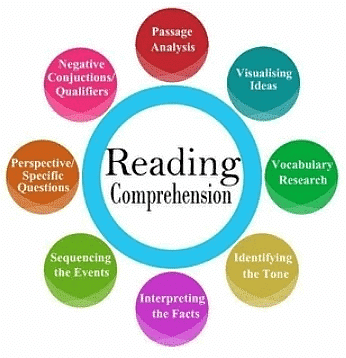Introduction: Reading Comprehension | Critical Analysis & Reasoning Skills for MCAT PDF Download

Introduction
The act of reading is a cognitive process wherein individuals engage with text to grasp its meaning. Repeated readings enhance comprehension by delving into the deeper layers of a text, facilitating the interpretation of its inherent significance. Comprehension, essentially synonymous with understanding, hinges significantly on an individual's vocabulary prowess, enabling them to grasp the nuances of a given text.
Unseen Passages
Unseen passages are excerpts extracted from unfamiliar texts, serving as a gauge for evaluating a student's comprehension abilities through questions derived from the passages. These questions, whether direct or indirect, may necessitate one reading for answers or require the ability to draw inferences. Students may also need to discern the interconnectedness of different parts of a text or relate new information to their existing knowledge.
Objectives
Comprehension exercises aim to assess students' capacity to:
- Grasp both local and global meanings within a text.
- Identify the primary subjects addressed in the text.
- Recognize inferences drawn from the text.
- Comprehend and articulate ideas presented in the passage using clear and concise language.
- Engage in critical thinking.
- Derive conclusions through a thorough understanding of the text.
Additionally, these exercises evaluate the students' vocabulary proficiency.
Type of Passages
There are three primary types of passages:
- Factual
- Discursive
- Literary
Factual Passage
Factual passages are grounded in established facts, either from research findings or universally known information. These passages provide limited room for drawing inferences or conclusions. Questions may require short answers, sentence completion, or multiple-choice responses, necessitating careful reading and understanding. Vocabulary-based questions assess the students' language proficiency.
Discursive Passage
Discursive passages revolve around the writer's opinions and proceed through reasoning or arguments based on facts. Comprehension is tested through short-answer questions and vocabulary-based inquiries. The main objective is to evaluate students' vocabulary skills by deciphering word meanings, identifying words from meanings, and recognizing synonyms or antonyms within the passage.
Literary Passage
The literary passage falls under the category of written pieces derived from artistic literary works, such as fiction, novels, or short stories. In this type of passage, there is no room for personal opinions or interpretations; the author's words must be comprehended and rephrased in one's own words for answering purposes.
Always Remember
- The passage contains explicit information about the subject addressed.
- If factual, the passage may present real-life incidents or information about a known entity, place, or thing.
- If discursive, the passage may be extracted from a narrative essay, speech, realistic fiction, or similar genre.
- Figurative language may be used, necessitating a deeper analysis to decipher meanings.
- Questions are typically in a logical sequence following the passage, and some may require an overall understanding or analysis based on tense.
- The main idea of the passage can often be found in the first or last sentence of a paragraph.
Some smart tips & tricks to score good in reading section
- Thoroughly read the passage for a deeper understanding.
- Underline relevant details if necessary.
- Respond to questions using short, simple sentences.
- Avoid extracting sentences verbatim without relevance.
- Utilize necessary words or phrases from the passage for answering questions.
- When addressing 'what,' 'where,' 'who,' 'when,' and 'how' questions, stick to facts presented in the passage.
- For 'why' questions, begin answers with 'This is because...' and refrain from repeating the question.
- Use the same parts of speech as the text when providing answers.
- For title-related queries, consider ideas from the first or last sentence of the passage.
- For vocabulary-based questions, substitute given words with identified words from the passage, ensuring the same meaning.

Read the passage given below:
On June 24, 1859, Emperors Napoleon III and Franz Joseph I engaged in the Battle of Solferino, commanding a com The choices we make on a daily basis-wearing a seatbelt, lifting heavy objects correctly or purposely staying out of any dangerous situation-can either ensure our safety or bring about potentially harmful circumstances.
You and I need to make a decision that we are going to get our lives in order. Exercising self-control, self-discipline and establishing boundaries and borders in our lives are some of the most important things we can do. A life without discipline is one that's filled with carelessness.
We can think it's kind of exciting to live life on the edge. We like the image of "Yeah! That's me! Living on the edge! Woo-hoo!" It's become a popular way to look at life. But if you see, even highways have lines, which provide margins for our safety while we're driving. If we go over one side, we'll go into the ditch. If we cross over the line in the middle, we could get killed. And we like those lines because they help to keep us safe. Sometimes we don't even realize how lines help to keep us safe.
I'm not proud of this, but for the first 20 years of my life at work, I ignored my limits. I felt horrible, physically, most of the time. I used to tell myself "I know I have limits and that I've reached them, but I'm going to ignore them and see if or how long I can get by with it." I ran to doctors, trying to make myself feel better through pills, vitamins, natural stuff and anything I could get my hands on. Some of the doctors would tell me, "It's just stress." That just made me mad. I thought stress meant you don't like what you do or can't handle life, and I love what I do. But I kept pushing myself, travelling, doing speaking engagements and so on—simply exhausting myself.
Finally, I understood I was living an unsustainable life and needed to make some changes in my outlook and lifestyle.
You and I don't have to be like everyone else or keep up with anyone else. Each of us needs to be exactly the way we are, and we don't have to apologize for it. We're not all alike and we need to find a comfort zone in which we can enjoy our lives instead of making ourselves sick with an overload of stress and pressure.
On the basis of your understanding of the passage, answer the following questions that follow:
Q1: Why has living on the edge become popular, according to the passage?
(a) constant need for something different
(b) population being much younger
(c) exhausting effort to make changes
(d) strong tendency to stay within our limits
Ans: (a)
Q2: Which option best captures the central idea of the passage from the given quotes?
(a) Option (1)
(b) Option (2)
(c) Option (3)
(d) Option (4)
Ans: (d)
Q3: What characteristics aptly describe the writer in the given context of defying limits?
- negligent
- indecisive
- spontaneous
- reckless
- purposeless
- patient
(a) 2 and 5
(b) 3 and 6
(c) 1 and 4
(d) 2 and 3
Ans: (c)
Q4: What would be the most appropriate title for the passage?
(a) Much too soon
(b) Enough is enough
(c) How much is too much?
(d) Have enough to do?
Ans: (c)
Q5: The phrase "potentially harmful circumstances" refers to circumstances that can:
(a) certainly be dangerous
(b) be fairly dangerous
(c) be possibly dangerous
(d) seldom be dangerous
Ans: (c)
Q6: Select the option that correctly uses "unsustainable" to fill in the blank space.
(a) In the long run, the ____ officials followed emergency procedures.
(b) Emergency procedures were ____ by the officials.
(c) Officials reported an ____ set of events during the emergency.
(d) Officials admit that the emergency system is ____ in the longer run.
Ans: (d)
Q7: What is the author attempting to do through this write-up?
(a) rebuke
(b) question
(c) offer aid to
(d) offer advice to
Ans: (d)
Q8: Which of the following is NOT a colloquial word used by the author?
(a) hooked
(b) guy
(c) stuff
(d) stress
Ans: (d)
Q9: What does the author mean by "To get our lives in order"?
(a) To resume our lives.
(b) To organize our lives.
(c) To rebuild our lives.
(d) To control our lives.
Ans: (b)
Q10: Choose the option that correctly states the two meanings of 'outlook' as used in the passage.
- A person's evaluation of life
- A person's experiences in life
- A person's point of view towards life
- A person's regrets in life
- A person's general attitude to life
(a) (1) and (4)
(b) (2) and (3)
(c) (3) and (5)
(d) (4) and (5)
Ans: (c)
Q11: The author explains the importance of discipline and boundaries in our lives using the example of:
(a) road accidents
(b) traffic rules
(c) lines on the highway
(d) safe driving
Ans: (c)
Q12: What message is conveyed in the last paragraph of the passage?
(a) Love what you do.
(b) Love yourself to love others.
(c) Be the best version of yourself.
(d) Be yourself.
Ans: (c)

|
14 videos|37 docs
|
FAQs on Introduction: Reading Comprehension - Critical Analysis & Reasoning Skills for MCAT
| 1. What is the HPSC (Haryana) exam? |  |
| 2. How can I apply for the HPSC exam? |  |
| 3. What is the syllabus for the HPSC exam? |  |
| 4. What is the eligibility criteria for the HPSC exam? |  |
| 5. How can I prepare for the HPSC exam? |  |





















